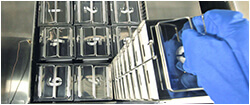Remant Clinical
Remnant clinical samples, often referred to as residual or surplus samples, are biological specimens collected during routine clinical procedures for diagnostic or treatment purposes. These samples may include blood, urine, tissues, or other biological materials. Instead of being discarded after the initial clinical testing, these remnant samples can be repurposed for various research and quality improvement purposes. Here are some common uses of remnant clinical samples:
Biomedical Research
Remnant clinical samples are valuable resources for biomedical research. Researchers can use these samples to investigate disease mechanisms, identify biomarkers, study genetic variations, and explore potential therapeutic targets.
Genomic Studies
Remnant samples, particularly blood or tissue samples, can be utilized for genomic studies. This includes DNA, RNA, and epigenetic analyses, enabling researchers to investigate genetic factors associated with diseases or assess the molecular basis of conditions.
Biomarker Discovery
Researchers can use remnant samples to discover and validate biomarkers associated with specific diseases. Biomarkers are crucial for early detection, diagnosis, and monitoring of diseases, as well as for predicting treatment responses.
Epidemiological Studies
Remnant samples can contribute to epidemiological studies aimed at understanding the prevalence, incidence, and risk factors of diseases within a population. This can provide valuable insights into public health and contribute to disease prevention strategies.

BioStorage
See why we’re San Diego’s leading storage provider for the biopharma and device industries.
Drug Development and Validation
Pharmaceutical and biotechnology companies can use remnant samples to validate drug targets, assess drug efficacy, and study drug metabolism. This can accelerate the drug development process and improve the understanding of drug effects in diverse patient populations.
Quality Improvement and Assay Validation
Remnant clinical samples can be used to assess and validate new diagnostic assays or laboratory techniques. This is particularly important for improving the accuracy and reliability of clinical testing procedures.
Ethical and Cost-Effective Research
Using remnant samples for research purposes is often considered more ethical than collecting new samples, as it minimizes the burden on patients. Additionally, repurposing remnant samples is cost-effective compared to starting new sample collection initiatives.
Training and Education
Remnant clinical samples can be used for educational purposes, providing students and trainees with hands-on experience in laboratory techniques and diagnostic procedures.
It is important to note that the use of remnant clinical samples for research should be conducted in accordance with ethical guidelines and informed consent processes. Respecting patient privacy and ensuring that samples are de-identified or anonymized are critical considerations in utilizing these valuable resources for research purposes.
Saba adds value to any team and makes an organization better. He is driven, tireless, and fearless but can adapt his approach . . .
